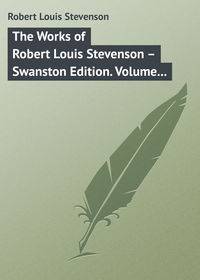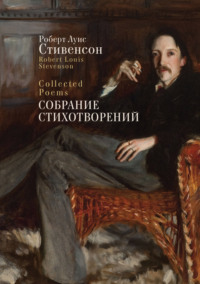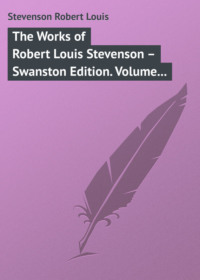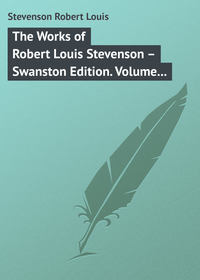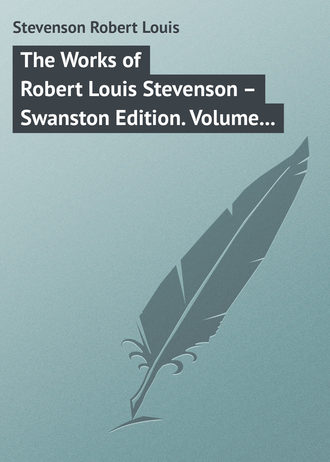 полная версия
полная версияThe Works of Robert Louis Stevenson – Swanston Edition. Volume 10
But there was to be no remission of the strokes of fate. As he thus sat, taking breath in the shadow of the wall, and hopped about by sparrows, it chanced that his eye roved to the fastening of the door; and what he saw plucked him to his feet. The thing locked with a spring; once the door was closed, the bolt shot of itself; and without a key there was no means of entering from the road.
He saw himself compelled to one of two distasteful and perilous alternatives: either to shut the door altogether and set his portmanteau out upon the wayside, a wonder to all beholders; or to leave the door ajar, so that any thievish tramp or holiday schoolboy might stray in and stumble on the grisly secret. To the last, as the least desperate, his mind inclined; but he must first insure himself that he was unobserved. He peered out, and down the long road: it lay dead empty. He went to the corner of the by-road that comes by way of Dean; there also not a passenger was stirring. Plainly it was, now or never, the high tide of his affairs; and he drew the door as close as he durst, slipped a pebble in the chink, and made off downhill to find a cab.
Half-way down a gate opened, and a troop of Christmas children sallied forth in the most cheerful humour, followed more soberly by a smiling mother.
“And this is Christmas Day!” thought John; and could have laughed aloud in tragic bitterness of heart.
CHAPTER VII
A TRAGI-COMEDY IN A CAB
In front of Donaldson’s Hospital, John counted it good fortune to perceive a cab a great way off, and by much shouting and waving of his arm, to catch the notice of the driver. He counted it good fortune, for the time was long to him till he should have done for ever with the Lodge; and the farther he must go to find a cab, the greater the chance that the inevitable discovery had taken place, and that he should return to find the garden full of angry neighbours. Yet when the vehicle drew up he was sensibly chagrined to recognise the port-wine cabman of the night before. “Here,” he could not but reflect, “here is another link in the Judicial Error.”
The driver, on the other hand, was pleased to drop again upon so liberal a fare; and as he was a man – the reader must already have perceived – of easy, not to say familiar, manners, he dropped at once into a vein of friendly talk, commenting on the weather, on the sacred season, which struck him chiefly in the light of a day of liberal gratuities, on the chance which had reunited him to a pleasing customer, and on the fact that John had been (as he was pleased to call it) visibly “on the ran-dan” the night before.
“And ye look dreidful bad the-day, sir, I must say that,” he continued. “There’s nothing like a dram for ye – if ye’ll take my advice of it; and bein’ as it’s Christmas, I’m no’ saying,” he added, with a fatherly smile, “but what I would join ye mysel’.”
John had listened with a sick heart.
“I’ll give you a dram when we’ve got through,” said he, affecting a sprightliness which sat on him most unhandsomely, “and not a drop till then. Business first and pleasure afterwards.”
With this promise the jarvey was prevailed upon to clamber to his place and drive, with hideous deliberation, to the door of the Lodge. There were no signs as yet of any public emotion; only, two men stood not far off in talk, and their presence, seen from afar, set John’s pulses buzzing. He might have spared himself his fright, for the pair were lost in some dispute of a theological complexion, and, with lengthened upper lip and enumerating fingers, pursued the matter of their difference, and paid no heed to John.
But the cabman proved a thorn in the flesh. Nothing would keep him on his perch; he must clamber down, comment upon the pebble in the door (which he regarded as an ingenious but unsafe device), help John with the portmanteau, and enliven matters with a flow of speech, and especially of questions, which I thus condense: —
“He’ll no’ be here himsel’, will he? No? Well, he’s an eccentric man – a fair oddity – if ye ken the expression. Great trouble with his tenants, they tell me. I’ve driven the faim’ly for years. I drove a cab at his father’s waddin’. What’ll your name be? – I should ken your face. Baigrey, ye say? There were Baigreys about Gilmerton; ye’ll be one of that lot? Then this’ll be a friend’s portmantie, like? Why? Because the name upon it’s Nucholson! O, if ye’re in a hurry, that’s another job. Waverley Brig’? Are ye for away?”
So the friendly toper prated and questioned and kept John’s heart in a flutter. But to this also, as to other evils under the sun, there came a period; and the victim of circumstances began at last to rumble towards the railway terminus at Waverley Bridge. During the transit he sat with raised glasses in the frosty chill and mouldy fœtor of his chariot, and glanced out sidelong on the holiday face of things, the shuttered shops, and the crowds along the pavement, much as the rider in the Tyburn cart may have observed the concourse gathering to his execution.
At the station his spirits rose again; another stage of his escape was fortunately ended – he began to spy blue water. He called a railway porter, and bade him carry the portmanteau to the cloak-room: not that he had any notion of delay; flight, instant flight, was his design, no matter whither; but he had determined to dismiss the cabman ere he named, or even chose, his destination, thus possibly baulking the Judicial Error of another link. This was his cunning aim, and now with one foot on the roadway, and one still on the coach-step, he made haste to put the thing in practice, and plunged his hand into his trousers-pocket.
There was nothing there!
O, yes; this time he was to blame. He should have remembered, and when he deserted his blood-stained pantaloons, he should not have deserted along with them his purse. Make the most of his error, and then compare it with the punishment. Conceive his new position, for I lack words to picture it; conceive him condemned to return to that house, from the very thought of which his soul revolted, and once more to expose himself to capture on the very scene of the misdeed: conceive him linked to the mouldy cab and the familiar cabman. John cursed the cabman silently, and then it occurred to him that he must stop the incarceration of his portmanteau; that, at least, he must keep close at hand, and he returned to recall the porter. But his reflections, brief as they had appeared, must have occupied him longer than he supposed, and there was the man already returning with the receipt.
Well, that was settled; he had lost his portmanteau also; for the sixpence with which he had paid the Murrayfield Toll was one that had strayed alone into his waistcoat-pocket, and unless he once more successfully achieved the adventure of the house of crime, his portmanteau lay in the cloak-room in eternal pawn, for lack of a penny fee. And then he remembered the porter, who stood suggestively attentive, words of gratitude hanging on his lips.
John hunted right and left; he found a coin – prayed God that it was a sovereign – drew it out, beheld a halfpenny, and offered it to the porter.
The man’s jaw dropped.
“It’s only a halfpenny,” he said, startled out of railway decency.
“I know that,” said John piteously.
And here the porter recovered the dignity of man.
“Thank you, sir,” said he, and would have returned the base gratuity. But John, too, would none of it; and as they struggled, who must join in but the cabman?
“Hoots, Mr. Baigrey,” said he, “you surely forget what day it is!”
“I tell you I have no change!” cried John.
“Well,” said the driver, “and what then? I would rather give a man a shillin’ on a day like this than put him off with a derision like a bawbee. I’m surprised at the like of you, Mr. Baigrey!”
“My name is not Baigrey!” broke out John, in mere childish temper and distress.
“Ye told me it was yoursel’,” said the cabman.
“I know I did; and what the devil right had you to ask?” cried the unhappy one.
“O very well,” said the driver. “I know my place, if you know yours – if you know yours!” he repeated, as one who should imply grave doubts; and muttered inarticulate thunders, in which the grand old name of gentleman was taken seemingly in vain.
O to have been able to discharge this monster, whom John now perceived, with tardy clear-sightedness, to have begun betimes the festivities of Christmas! But far from any such ray of consolation visiting the lost, he stood bare of help and helpers, his portmanteau sequestered in one place, his money deserted in another and guarded by a corpse; himself, so sedulous of privacy, the cynosure of all men’s eyes about the station; and, as if these were not enough mischances, he was now fallen in ill-blood with the beast to whom his poverty had linked him! In ill-blood, as he reflected dismally, with the witness who perhaps might hang or save him! There was no time to be lost; he durst not linger any longer in that public spot; and whether he had recourse to dignity or to conciliation, the remedy must be applied at once. Some happily surviving element of manhood moved him to the former.
“Let us have no more of this,” said he, his foot once more upon the step. “Go back to where we came from.”
He had avoided the name of any destination, for there was now quite a little band of railway folk about the cab, and he still kept an eye upon the court of justice, and laboured to avoid concentric evidence. But here again the fatal jarvey out-manœuvred him.
“Back to the Ludge?” cried he, in shrill tones of protest.
“Drive on at once!” roared John, and slammed the door behind him, so that the crazy chariot rocked and jingled.
Forth trundled the cab into the Christmas streets, the fare within plunged in the blackness of a despair that neighboured on unconsciousness, the driver on the box digesting his rebuke and his customer’s duplicity. I would not be thought to put the pair in competition; John’s case was out of all parallel. But the cabman, too, is worth the sympathy of the judicious; for he was a fellow of genuine kindliness and a high sense of personal dignity incensed by drink; and his advances had been cruelly and publicly rebuffed. As he drove, therefore, he counted his wrongs, and thirsted for sympathy and drink. Now, it chanced he had a friend, a publican in Queensferry Street, from whom, in view of the sacredness of the occasion, he thought he might extract a dram. Queensferry Street lies something off the direct road to Murrayfield. But then there is the hilly cross-road that passes by the valley of the Leith and the Dean Cemetery; and Queensferry Street is on the way to that. What was to hinder the cabman, since his horse was dumb, from choosing the cross-roads, and calling on his friend in passing? So it was decided; and the charioteer, already somewhat mollified, turned aside his horse to the right.
John, meanwhile, sat collapsed, his chin sunk upon his chest, his mind in abeyance. The smell of the cab was still faintly present to his senses, and a certain leaden chill about his feet; all else had disappeared in one vast oppression of calamity and physical faintness. It was drawing on to noon – two-and-twenty hours since he had broken bread; in the interval he had suffered tortures of sorrow and alarm, and had been partly tipsy; and though it was impossible to say he slept, yet when the cab stopped, and the cabman thrust his head into the window, his attention had to be recalled from depths of vacancy.
“If you’ll no’ stand me a dram,” said the driver, with a well-merited severity of tone and manner, “I daresay ye’ll have no objection to my taking one mysel’?”
“Yes – no – do what you like,” returned John; and then, as he watched his tormentor mount the stairs and enter the whisky-shop, there floated into his mind a sense as of something long ago familiar. At that he started fully awake, and stared at the shop-fronts. Yes, he knew them; but when? and how? Long since, he thought; and then, casting his eye through the front glass, which had been recently occluded by the figure of the jarvey, he beheld the tree-tops of the rookery in Randolph Crescent. He was close to home – home, where he had thought, at that hour, to be sitting in the well-remembered drawing-room in friendly converse; and, instead – !
It was his first impulse to drop into the bottom of the cab; his next, to cover his face with his hands. So he sat, while the cabman toasted the publican, and the publican toasted the cabman, and both reviewed the affairs of the nation; so he still sat, when his master condescended to return, and drive off at last downhill, along the curve of Lynedoch Place; but even so sitting, as he passed the end of his father’s street, he took one glance from between shielding fingers, and beheld a doctor’s carriage at the door.
“Well, just so,” thought he; “I’ll have killed my father! And this is Christmas Day!”
If Mr. Nicholson died, it was down this same road he must journey to the grave; and down this road, on the same errand, his wife had preceded him years before; and many other leading citizens, with the proper trappings and attendance of the end. And now, in that frosty, ill-smelling, straw-carpeted, and ragged-cushioned cab, with his breath congealing on the glasses, towards what other destination was John himself advancing?
The thought stirred his imagination, which began to manufacture many thousand pictures, bright and fleeting like the shapes in a kaleidoscope; and now he saw himself, ruddy and comfortered, sliding in the gutter; and again a little woe-begone, bored urchin tricked forth in crape and weepers, descending this same hill at the foot’s-pace of mourning coaches, his mother’s body just preceding him; and yet again, his fancy, running far in front, showed him the house at Murrayfield – now standing solitary in the low sunshine, with the sparrows hopping on the threshold and the dead man within staring at the roof, and now, with a sudden change, thronged about with white-faced, hand-uplifting neighbours, the doctor bursting through their midst and fixing his stethoscope as he went, the policeman shaking a sagacious head beside the body. It was to this he feared that he was driving; in the midst of this he saw himself arrive, heard himself stammer faint explanations, and felt the hand of the constable upon his shoulder. Heavens! how he wished he had played the manlier part; how he despised himself that he had fled that fatal neighbourhood when all was quiet, and should now be tamely travelling back when it was thronging with avengers!
Any strong degree of passion lends, even to the dullest, the forces of the imagination. And so now as he dwelt on what was probably awaiting him at the end of this distressful drive – John, who saw things little, remembered them less, and could not have described them at all, beheld in his mind’s eye the garden of the Lodge, detailed as in a map; he went to and fro in it, feeling his terrors; he saw the hollies, the snowy borders, the paths where he had sought Alan, the high, conventual walls, the shut door – what! was the door shut? Ay, truly, he had shut it – shut in his money, his escape, his future life – shut it with these hands, and none could now open it! He heard the snap of the spring-lock like something bursting in his brain, and sat astonied.
And then he woke again, terror jarring through his vitals. This was no time to be idle; he must be up and doing, he must think. Once at the end of this ridiculous cruise, once at the Lodge door, there would be nothing for it but to turn the cab and trundle back again. Why, then, go so far? why add another feature of suspicion to a case already so suggestive? why not turn at once? It was easy to say, turn, but whither? He had nowhere now to go to; he could never – he saw it in letters of blood – he could never pay that cab; he was saddled with that cab for ever. O that cab! his soul yearned to be rid of it. He forgot all other cares. He must first quit himself of this ill-smelling vehicle and of the human beast that guided it – first do that; do that at least; do that at once.
And just then the cab suddenly stopped, and there was his persecutor rapping on the front glass. John let it down, and beheld the port-wine countenance flamed with intellectual triumph.
“I ken wha ye are!” cried the husky voice. “I mind ye now. Ye’re a Nucholson. I drove ye to Hermiston to a Christmas party, and ye came back on the box, and I let ye drive.”
It was a fact. John knew the man; they had been even friends. His enemy, he now remembered, was a fellow of great good-nature – endless good-nature – with a boy; why not with a man? Why not appeal to his better side? He grasped at the new hope.
“Great Scott; and so you did,” he cried, as if in a transport of delight, his voice sounding false in his own ears. “Well, if that’s so, I’ve something to say to you. I’ll just get out, I guess. Where are we, any way?”
The driver had fluttered his ticket in the eyes of the branch toll-keeper, and they were now brought to on the highest and most solitary part of the by-road. On the left, a row of field-side trees beshaded it; on the right it was bordered by naked fallows, undulating downhill to the Queensferry Road; in front, Corstorphine Hill raised its snow-bedabbled, darkling woods against the sky. John looked all about him, drinking the clear air like wine; then, his eyes returned to the cabman’s face as he sat, not ungleefully, awaiting John’s communication, with the air of one looking to be tipped.
The features of that face were hard to read, drink had so swollen them, drink had so painted them, in tints that varied from brick-red to mulberry. The small grey eyes blinked, the lips moved, with greed; greed was the ruling passion; and though there was some good-nature, some genuine kindliness, a true human touch, in the old toper, his greed was now so set afire by hope, that all other traits of character lay dormant. He sat there a monument of gluttonous desire.
John’s heart slowly fell. He had opened his lips, but he stood there and uttered nought. He sounded the well of his courage, and it was dry. He groped in his treasury of words, and it was vacant. A devil of dumbness had him by the throat; a devil of terror babbled in his ears; and suddenly, without a word uttered, with no conscious purpose formed in his will, John whipped about, tumbled over the roadside wall, and began running for his life across the fallows.
He had not gone far, he was not past the midst of the first field, when his whole brain thundered within him, “Fool! You have your watch!” The shock stopped him and he faced once more towards the cab. The driver was leaning over the wall, brandishing his whip, his face empurpled, roaring like a bull. And John saw (or thought) that he had lost the chance. No watch would pacify the man’s resentment now; he would cry for vengeance also. John would be under the eye of the police; his tale would be unfolded, his secret plumbed, his destiny would close on him at last, and for ever.
He uttered a deep sigh; and just as the cabman, taking heart of grace, was beginning at last to scale the wall, his defaulting customer fell again to running and disappeared into the farther fields.
CHAPTER VIII
SINGULAR INSTANCE OF THE UTILITY OF PASS-KEYS
Where he ran at first, John never very clearly knew; nor yet how long a time elapsed ere he found himself in the by-road near the lodge of Ravelston, propped against the wall, his lungs heaving like bellows, his legs leaden-heavy, his mind possessed by one sole desire – to lie down and be unseen. He remembered the thick coverts round the quarry-hole pond, an untrodden corner of the world where he might surely find concealment till the night should fall. Thither he passed down the lane; and when he came there, behold! he had forgotten the frost, and the pond was alive with young people skating, and the pond-side coverts were thick with lookers-on. He looked on awhile himself. There was one tall, graceful maiden, skating hand in hand with a youth, on whom she bestowed her bright eyes perhaps too patently; and it was strange with what anger John beheld her. He could have broken forth in curses; he could have stood there, like a mortified tramp, and shaken his fist and vented his gall upon her by the hour – or so he thought; and the next moment his heart bled for the girl. “Poor creature, it’s little she knows!” he sighed. “Let her enjoy herself while she can!” But was it possible, when Flora used to smile at him on the Braid ponds, she could have looked so fulsome to a sick-hearted bystander?
The thought of one quarry, in his frozen wits, suggested another; and he plodded off towards Craigleith. A wind had sprung up out of the north-west; it was cruel keen, it dried him like a fire, and racked his finger-joints. It brought clouds, too; pale, swift, hurrying clouds, that blotted heaven and shed gloom upon the earth. He scrambled up among the hazelled rubbish-heaps that surround the cauldron of the quarry, and lay flat upon the stones. The wind searched close along the earth, the stones were cutting and icy, the bare hazels wailed about him; and soon the air of the afternoon began to be vocal with those strange and dismal harpings that herald snow. Pain and misery turned in John’s limbs to a harrowing impatience and blind desire of change; now he would roll in his harsh lair, and when the flints abraded him was almost pleased; now he would crawl to the edge of the huge pit and look dizzily down. He saw the spiral of the descending roadway, the steep crags, the clinging bushes, the peppering of snow-wreaths, and, far down in the bottom, the diminished crane. Here, no doubt, was a way to end it. But it somehow did not take his fancy.
And suddenly he was aware that he was hungry; ay, even through the tortures of the cold, even through the frosts of despair, a gross, desperate longing after food, no matter what, no matter how, began to wake and spur him. Suppose he pawned his watch? But no, on Christmas Day – this was Christmas Day! – the pawn-shop would be closed. Suppose he went to the public-house close by at Blackhall, and offered the watch, which was worth ten pounds, in payment for a meal of bread and cheese? The incongruity was too remarkable; the good folks would either put him to the door, or only let him in to send for the police. He turned his pockets out one after another; some San Francisco tram-car checks, one cigar, no lights, the pass-key to his father’s house, a pocket-handkerchief, with just a touch of scent: no – money could be raised on none of these. There was nothing for it but to starve; and after all, what mattered it! That also was a door of exit.
He crept close among the bushes, the wind playing round him like a lash; his clothes seemed thin as paper, his joints burned, his skin curdled on his bones. He had a vision of a high-lying cattle-drive in California, and the bed of a dried stream with one muddy pool, by which the vaqueros had encamped: splendid sun over all, the big bonfire blazing, the strips of cow browning and smoking on a skewer of wood; how warm it was, how savoury the steam of scorching meat! And then again he remembered his manifold calamities, and burrowed and wallowed in the sense of his disgrace and shame. And next he was entering Frank’s restaurant in Montgomery Street, San Francisco; he had ordered a pan-stew and venison chops, of which he was immoderately fond, and as he sat waiting, Munroe, the good attendant, brought him a whisky-punch; he saw the strawberries float on the delectable cup, he heard the ice chink about the straws. And then he woke again to his detested fate, and found himself sitting, humped together, in a windy combe of quarry-refuse – darkness thick about him, thin flakes of snow lying here and there like rags of paper, and the strong shuddering of his body clashing his teeth like a hiccough.
We have seen John in nothing but the stormiest conditions; we have seen him reckless, desperate, tried beyond his moderate powers: of his daily self, cheerful, regular, not unthrifty, we have seen nothing; and it may thus be a surprise to the reader to learn that he was studiously careful of his health. This favourite pre-occupation now awoke. If he were to sit there and die of cold, there would be mighty little gained; better the police cell and the chances of a jury trial, than the miserable certainty of death at a dyke-side before the next winter’s dawn, or death a little later in the gas-lit wards of an infirmary.



